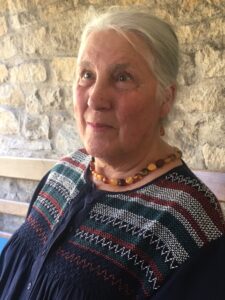Ellen Bassani

In this piece I hope to share my experience of feeling included within my spiritual community, where I’ve been a member for over forty years.
Let me offer a limited biography, so my observations may be put into context.
My background is Australian, which makes me prone to outspoken directness. Over the years I’ve tried to temper this, with limited success. Raised Roman Catholic, I found that Quaker spirituality, at its simplest and most profound, moved me away from any attachment to the faith of my childhood. Yet perhaps a certain rigidity of belief still lingers.
I was married in the meeting house: a marriage organized and supported by beloved Friends. My two children were raised in the meeting. Our dear Virginia can testify to the challenges that this provided. Shamefully, because of their behaviour, my two were once led from the meeting house by an elder.
My work history is as a Social Worker and a Disability Equality trainer. The latter career took me to China, Poland, and Perm in Russia. I believed this experience might be helpful to my meeting.
The other strand of this biography is my blind history. I have very little useful vision. Life in those early years of membership as a mother of one non-disabled and one learning-disabled child was beyond stressful, with my own family twelve thousand miles away. How would I have survived without the loving care of individuals from Oxford Meeting?
My husband also had a neurodiverse condition which, combined with my blindness, almost crushed me. Every Sunday my children and I were driven to meeting and returned home, a little more refreshed.
Every month a team of Friends would don marigolds and come and try to set my home aright. During this time, I was lovingly read to and mentored by the redoubtable Margaret Ainger – unforgettable!
There aren’t enough words to express my deep gratitude to all. No idle words to claim that they made living possible.
However, in this loving garden of Eden I MIGHT have spied a serpent. Its form was hazy, yet my antenna flickered. In those early days, I didn’t feel respected as an equal. Into my needy, willing arms came help, advice, and hard work — but the talented professional me didn’t feel seen. It was my blindness that moulded my identity within my community. Certainly a feisty brave outspoken me was identified, however all through the lens of disability. I longed to give back yet wasn’t asked.
In a business meeting, when I brought my concerns about obstacles in the lobby, an elderly member suggested that it was my responsibility to adapt. Those were different times, when the Disability movement hadn’t made its mark. It still felt like a punch.
For the first fifteen years I was NEVER approached to join a committee even though I’d expressed an interest, believing that my professional background might be useful. Maybe my directness was seen as out of touch with my limits. It took a wonderful woman with a disabled son to strive for my inclusion. She was strenuously opposed. The opposition was not out of cruelty, but the belief that a blind person has too much to cope with and couldn’t manage the extra demands that a committee role might require. Even today losing one’s sight triggers a belief that one’s life is over. Those folk back then had the same responses. Onto my shoulders, was projected their Terror.
How did this negating make me feel? That I had nothing to give of worth. That I was invisible. To be blind robs me of other people’s body language, smiles, or nods of approval. Verbal validation was needed, especially back then, when my sense of self was all need and helplessness. The inner voice confirmed otherwise, but my environment continued to perpetuate these feelings.
These days I feel loved, valued and even sought after. Inclusion is much higher on the social agenda, and I am less overwhelmed in my personal life. So here’s one little piece of advice from a woman who loves her meeting and those within it. If there’s a question of asking persons with disabilities to undertake tasks within the life of the meeting, be aware of the assumptions you might be laying at their door. Remember that each of us is the expert of our own condition. This is particularly pertinent when an impairment is involved. Don’t try to protect me or other folk that have particular needs. Simply make the request and wait with an open heart for the answer. You never know, they may bring a perspective that hasn’t previously been considered. Never underestimate the grace bestowed by just asking.
| Next Article |
Back to September 2022 Newsletter Main Page
Forty-Three Newsletter • Number 521 • September 2022
Oxford Friends Meeting
43 St Giles, Oxford OX1 3LW
Copyright 2022, Oxford Quakers
